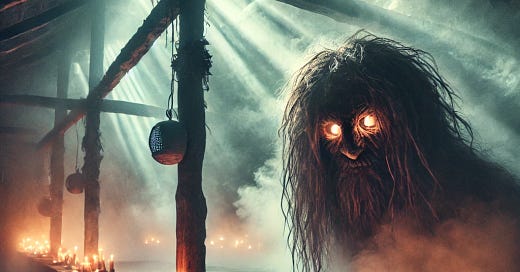Myth of the Day: Bannik
Discover the mystical guardian of Slavic bathhouses, a spirit offering foresight and requiring respect, bound within steamy realms.
Region/Culture: Russia, Central and Eastern Europe
Mythos: Slavic Mythology
Primary Type/Nature: Fairy Folk and Spirit Beings
Mythical Attributes: The Bannik is known to reside in bathhouses and possesses the power to predict the future.
Role in Mythos: Acts as the guardian spirit of the bathhouse, responsible for either bestowing blessings or curses on those who use the facility.
Relation to Humans: Humans often left offerings for the Bannik to remain in its good graces; however, if disrespected, the Bannik could become malevolent and bring harm.
In the folds of Slavic mythology, where everyday objects often host extraordinary beings, the Bannik stands out as a creature whose domain is as intimate as it is communal—the bathhouse. You may envision the Bannik as a humanoid figure, hazy in form but striking in presence. It often sports a mischievous grin or a set of eyes that seem to penetrate the steam and see you in ways you’d rather not be seen. Imagine bristles of untamed hair, sprouting as if in rhythm with the flickering steam, and gnarled, almost contemplative fingers, caressing the wooden beams of its abode.
The bathhouse in Central and Eastern Europe isn’t just a place for cleanliness; it’s a space ripe with social and spiritual resonance. Here is where the Bannik finds its home and purpose. According to legend, this being came into existence with the birth of the first bathhouse. Wood, water, and fire convened, and from their elements emerged a guardian spirit. The Bannik is not merely an occupant; it is the soul of the bathhouse, bound to its wooden beams and steaming basins.
Within the confines of its foggy kingdom, the Bannik holds sway over fortune itself. If you’ve ever wished to glimpse your future, the Bannik is the one to consult. Yet, it requires a certain respect for the rules of its domain. A misplaced towel or a scornful word could turn the spirit’s gaze from benevolent to malevolent. One prevalent myth tells of a young woman who, upon entering the bathhouse without paying her due respects, found herself cursed with perpetual ill fortune. It wasn’t until she returned, offering lavender and a heartfelt apology, that her luck began to mend.
You see, the Bannik isn’t particularly vengeful, but it does demand respect. Humans have long upheld the tradition of leaving offerings—be it food, cloth, or aromatic herbs—to secure the Bannik’s favor. It’s a symbiotic relationship, of sorts. In return for these gestures, the Bannik offers not only foresight but a sense of peace and well-being that permeates anyone fortunate enough to be in its good graces. The bathhouse, under the Bannik’s watchful eye, becomes a sanctuary of physical and spiritual renewal.
But what would be the point of power without limitations? The Bannik, for all its mystical attributes, has a fundamental constraint—it cannot leave the bathhouse. It is bound to its realm as tightly as a spider to its web. Stray too far from the wooden panels and steaming waters, and its influence dwindles into obscurity.
So, next time you find yourself entering a bathhouse in the depths of Russia or Central Europe, remember to pay your respects. A small token, a whispered word of thanks, may win you the favor of an entity as ancient as the walls that contain it, imbuing your life with a bit of mystic allure. But ignore the etiquette, and you risk drawing the ire of a being who’s as mischievous as it is mysterious. Choose wisely, for the steam hides more than just the grime of the day.
Suggested Further Reading
Explore more myths and wonders by visiting godsandmonsters.info.
Enjoy mythic tales on the move with our podcast, Five Minute Mythology.






Love this one. Thanks 😀
Fascinating.